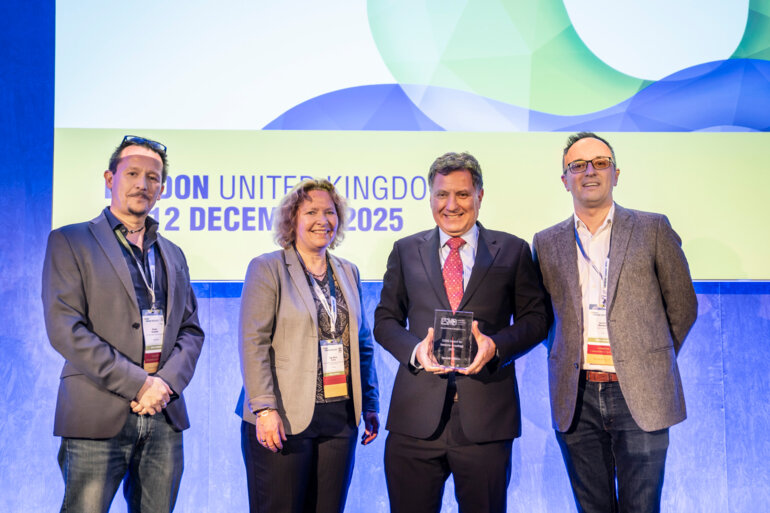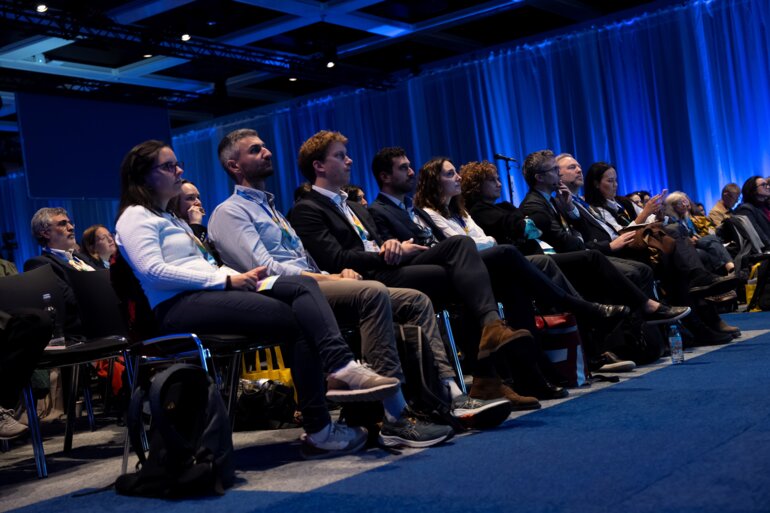Novel treatment approaches show encouraging early results in solid tumours, but ways to boost precision immunotherapy are needed
Unleashing the true power of immunotherapy in oncology is still challenging. While immunotherapeutic strategies continue to transform the cancer treatment landscape by improving outcomes and the long-term outlook for many patients, only subsets of cancer patients currently derive benefit from them and response rates vary across different tumour types.
New treatment modalities could further strengthen today’s immuno-oncology toolbox, and data from several early-phase clinical trials presented at the ESMO Congress 2024 show encouraging antitumour actions and activity, particularly in advanced solid tumours.
One such approach is targeting Ig-like transcript 2 (ILT2) immune checkpoint protein in solid tumours. In a Proffered paper session, dose escalation results were presented that provide early clinical evidence for targeting ILT2 in advanced cancer patients with unresectable or metastatic disease (refractory to or not candidates for standard approved therapy) (Abstract 990O ). Patients involved in the study received a first-in-class anti-ILT2 antibody, SAR444881, alone and in combination with pembrolizumab or cetuximab. Data showed that treatment was well tolerated in patients across all three treatment groups, with no reported dose-limiting toxicities or life-threatening/fatal treatment-related adverse effects. Dose escalation data demonstrated that 3 mg/kg and 10 mg/kg SAR444881 were safe and exhibited anti-tumour activity. The investigators demonstrated that ≥90% receptor occupancy can be achieved with doses of SAR444881 ≥3 mg and established the initial dose for dose optimization. Upregulation of activation markers in monocytes and ILT2-expression T and NK cell subsets was observed in a dose-dependent manner.
These findings provided the rationale for part 2 of this study. Treatment with this novel ILT2-targeting agent (administered both alone or in combination with other therapeutics) will be evaluated in a phase 2 dose optimization and expansion cohort. Patient enrollment is currently ongoing.
A second study could open a new therapeutic avenue for patients with immune checkpoint inhibitor-resistant non-small cell lung cancer (NSCLC) and melanoma. The open-label first-in-human phase 1/1b STAMINA-01 study of the ATG-037 small-molecule CD73 inhibitor, developed to reverse an immunosuppressed tumour microenvironment, was designed to evaluate the safety, pharmacokinetics, and optimal dose of this novel agent as monotherapy or in combination with anti-PD-1 therapy with pembrolizumab in patients advanced solid tumours (Abstract 997MO).
The preliminary efficacy data from the dose escalation part 1 of this study were presented, and the investigators observed that ATG-037, a potentially best-in-class inhibitor, completely blocks CD73 activity. They also saw encouraging partial responses in patients treated with combination therapy, with a good safety profile.
These initial results point to the combination of ATG-037 plus pembrolizumab as an effective and tolerable precision oncology strategy in patients with checkpoint inhibitor-resistant NSCLC and melanoma.
By harnessing replication-competent viruses to combat cancer, the emerging field of oncolytic virotherapy is also gaining pace and showing increasing promise in advanced/metastatic disease. Standout studies in this arena included the phase II IGNYTE trial (LBA46) assessing the efficacy of RP1 HSV-1 based oncolytic immunotherapy in advanced melanoma; two early-phase studies exploring combinations of the genetically engineered adenovirus LOAd703 with either immunotherapy in patients with advanced melanoma or chemotherapy in advanced solid tumours (Abstract 988O; Abstract 989O); and two dose-finding phase I studies with oncolytic viruses VG2025 (Abstract 994MO) and OVV-01 (Abstract 993MO) as monotherapy in patients with advanced solid tumours.
Challenges ahead
While the results from several early-phase clinical trials presented at this year’s ESMO Congress 2024 certainly signpost more effective therapeutic strategies, bringing these novel agents and approaches to the clinic will require further evaluation in expanded cohorts and, where possible, additional study designs that allow crossover to help reduce the potential side-effects of therapies in patients.
As we jump-start and potentiate the immune system to attack and destroy tumours in an increasing number of patients, we also need to identify new ‘leads’ that will enable us to further boost precision immunotherapy.
Moving forward, we must continue to translate basic cancer science into therapeutic clinical tools and advances in patient treatment and care. Illustrative of key developments in the context of immuno-oncology include deeper insights into the tumour microenvironment as a modulator of anticancer immune responses as well as the role of the host microbiome in the efficacy and toxicity of anticancer treatments including immune checkpoint inhibitors.
Predicting and managing immune-related adverse events on treatment would probably be game-changers in the future, but they are yet to be reached as milestones. Identifying and prospectively validating new predictive biomarkers of immunotherapy response to abate these associated toxicities are urgently required. A report in Nature Genetics revealed five independent factors that predict cancer patients' response to checkpoint inhibitors: tumour mutational burden, effective T-cell infiltration, TGF-β activity in the tumour microenvironment, previous treatment, and tumour proliferative potential (Nat Genet. 2024 Sep 12).
The investigators validated these factors in six independent cohorts, covering a total of more than 1,400 patients with different types of cancers including lung, colon and melanoma. These findings provide a framework to interpret biomarkers of response to checkpoint inhibitors and a future pathway to improve personalised cancer medicine.
Current and future research efforts aimed at better predicting response to cancer immunotherapy is likely to continue to generate valuable insights that could ultimately be integrated into clinical practice to help guide tailored therapeutic decision making. In parallel, the development of novel approaches such as multi-omics driven machine learning may further improve prediction of efficacy and bring new hope to an increasing number of patients.
Abstracts discussed at ESMO 2024
Perets R, et al. Final results from phase I, first-in-human, dose escalation study of a first-in-class anti-ILT2 antibody, SAR444881, alone and with pembrolizumab or cetuximab, in patients with advanced solid tumors.
ESMO Congress 2024, Abstract 990O
Kichenadasse G, et al. A first-in-human phase I/Ib study of ATG-037 monotherapy and combination therapy with pembrolizumab in patients with advanced solid tumors: STAMINA-01.
ESMO Congress 2024, Abstract 997MO
Hamid O, et al. A phase I/II trial (LOKON003) evaluating tumor microenvironment (TME) gene engineering using a viral vector combined with atezolizumab in advanced malignant melanoma.
ESMO Congress 2024, Abstract 988O
Hahn A, et al. Novel gene therapy in advanced solid malignancies: A phase I/II clinical trial.
ESMO Congress 2024, Abstract 989O
Shen Y, et al. The updated report of phase I trial of VG2025, a non-attenuated HSV-1 oncolytic virus expressing IL-12 and IL-15/Rα payloads, in patients with advanced solid tumors.
ESMO Congress 2024, Abstract 994MO
Hua Y, et al. A phase I, open-label, multicenter, dose escalation safety and tolerability study of oncolytic virus OVV-01 in advanced solid tumors.
ESMO Congress 2024, Abstract 993MO







